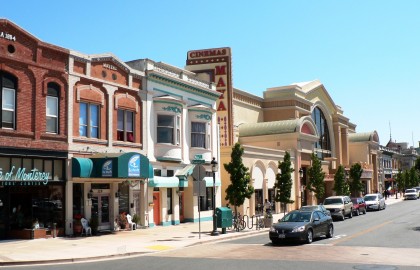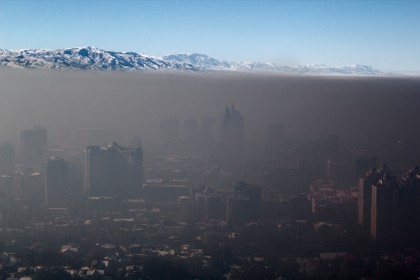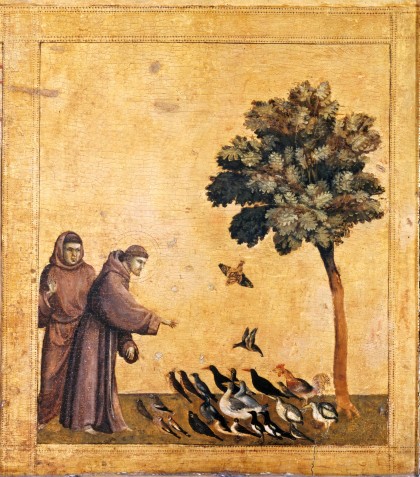Laudato Si: Beyond the talking points
Devra Torres | Jul 20, 2015 | 3 cmts
I’m pro-air-conditioning, especially when Michigan is so hot and sticky that being a spoiled first-worlder becomes a lesser evil than my crabbiness when I'm too hot and sticky.
I’m pro-capitalism, especially the mom-and-pop kind (and not so much the smarmy, crony, super-duper-mega-multinational, ideologically heavy-handed kind).

And I disagree with Pope Francis about global warming, but I love him anyway. (My scientific credentials? Certainly. I have an M.A. in phenomenological realism).
Now that we’ve got that out of the way, here's my impression of Laudato Si, so far.
I like this part:
[St. Francis’] response to the world around him was so much more than intellectual appreciation or economic calculus
It’s easy to imagine those are our only options: either intellectual appreciation or economic calculus. Intellectual appreciation can lead you beyond economic calculus, it's true, but it doesn’t necessarily lead you to contemplative wonder. That's a further step.
Pope Francis continues:
[F]or to [St. Francis0 each and every creature was a sister united to him by bonds of affection.[...] His disciple Saint Bonaventure tells us that, “from a reflection on the primary source of all things [...] he would call creatures, no matter how small, by the name of ‘brother’ or ‘sister’”.[20] Such a conviction cannot be written off as naive romanticism, for it affects the choices which determine our behaviour.
It’s very, very easy for us 21st-century types to do just that: write the whole thing off as naïve romanticism. It’s very, very easy for us to read about “creatures, no matter how small" and find our thoughts jumping immediately to political controversies about snail darters and dams.

But if we can turn off the part of our mind that immediately darts to political implications and drink in the meaning of being "united to every creature by bonds of affection," it sounds very different.
Pope Francis continues:
If we approach nature and the environment without this openness to awe and wonder, if we no longer speak the language of fraternity and beauty in our relationship with the world, our attitude will be that of masters, consumers, ruthless exploiters, unable to set limits on their immediate needs.
By contrast, if we feel intimately united with all that exists, then sobriety and care will well up spontaneously. The poverty and austerity of Saint Francis were no mere veneer of asceticism, but something much more radical: a refusal to turn reality into an object simply to be used and controlled.
A refusal to turn reality into an object simply to be used and controlled.
That right there is the unifying thread. Just as I'm not meant to reduce fellow human persons to raw material, to be rated on a scale of usefulness to me, or even to the human race,
 I'm not meant to reduce the whole natural world to a collection of more or less efficient tools to achieve my favorite ends.
I'm not meant to reduce the whole natural world to a collection of more or less efficient tools to achieve my favorite ends.
That doesn’t mean you can’t cut down a tree to make a bookcase, and it doesn’t mean you can’t drain a swamp to put up houses for human beings to live in, malaria-free. You're not required to put the welfare of the trees or the mosquitos ahead of the welfare of the human beings. It just means you don’t look at the whole world through the kind of pathetic, depressing tunnel vision that starts and ends with, “How can I manipulate this to my advantage?”
Cultivating wonder at everything from the structure of a fruit fly's DNA to the life cycle of a star fits in with fighting the many, many different ways we’ve devised of treating people as “objects to be used and controlled.” If you’re coherent, you’ll be against
- women and men treating each other as objects,
- companies treating customers as objects,
- sex traffickers treating their victims as objects,
- politicians treating their constituents as objects, and
- parents treating their children, or their eggs, or their sperm, or their zygotes, embryos, or fetuses as objects.
A refusal to turn reality into an object to be used and controlled. We in the John Paul II generation are accustomed to the call to treat persons as subjects, not objects. It's the key to so many legitimate social causes, both on the "right" (fighting abortion, euthanasia, pornography, collectivism, economic micromanagement) and the "left" (justice for the poor, care of migrants, racial justice, compassion and dignity for the disabled and socially or economically marginalized).

Pope Francis' call to respect the nature of nature--not just its usefulness to us--embraces all this and goes further besides. You could say it's a call to realism itself. We need to get to where we can see everything--everything!--from the tiniest creature to the human person to the noblest idea-- for what it is—not just for how it can be manipulated.
Whatever else you want to call Laudato Si, it's a heartfelt invitation to realism.


Comments (3)
Nanda
Jul 29, 2015 5:52pm
Brava, Devra! Very helpful indeed...Thank you!
Devra Torres
Jul 29, 2015 7:01pm
Thank YOU! I have lots more to say, but we're in the midst of moving and will be for at least another week or two.
Nanda
Jul 29, 2015 7:07pm
Look forward!